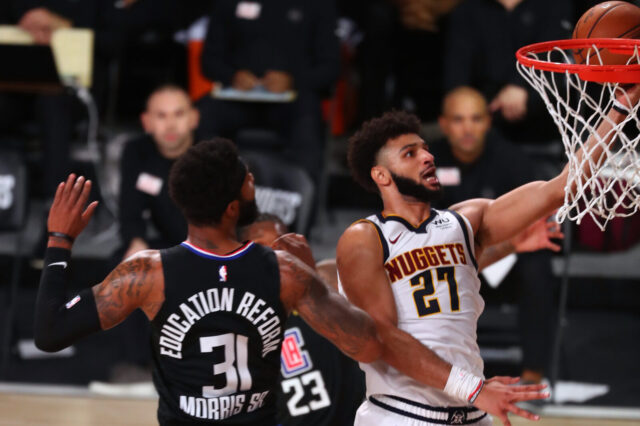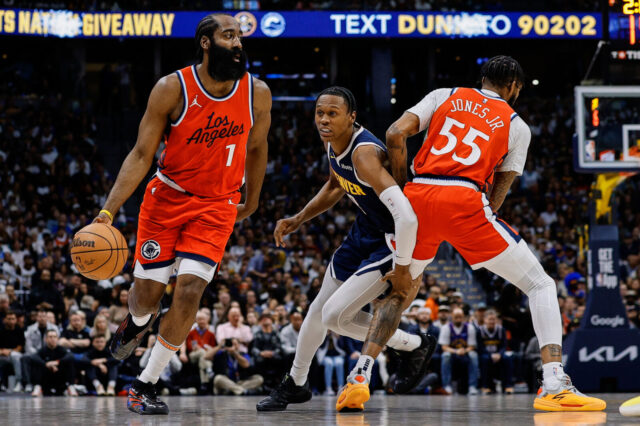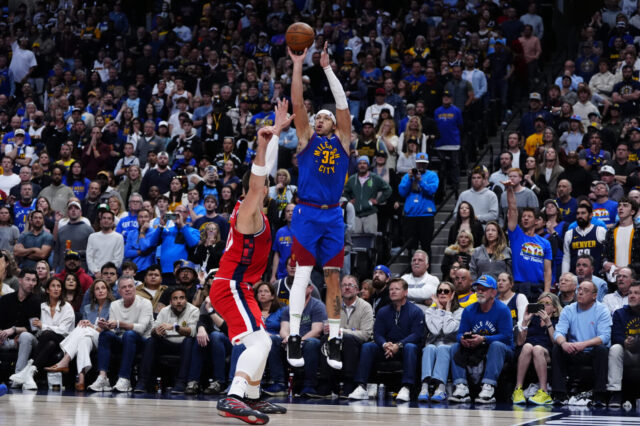The Denver Nuggets have a problem: they can’t decide what they want to be. Are they a free-flowing offense or a stagnant, walk-it-up one? Do they make the calls from the sidelines or improvise on the fly? Can they grit and grind on defense or will they have to make do with increased defense at certain positions and times?
After years with the same basic lineup you’d think these questions would be solved by now, but every year like clockwork the Nuggets spend the first month or two of the season re-litigating these same arguments. In the 2016-17 season, Denver had its first December 15th moment as Nikola Jokic was inserted into the starting lineup after dueling with Jusuf Nurkic for control of the team. Jokic volunteered to come off the bench after Denver struggled with both Nurkic and Jokic playing next to each other, but the team simply played better around him. Nurkic was eventually moved and the unique center-based offense that Denver featured was off and running.
Until the next fall, when Denver added Paul Millsap and Jokic deferred to the veteran and All-Star. Coach Michael Malone was calling Millsap’s number early in order to get him integrated and Jokic was happy to take a back seat – though it was not to Denver’s benefit. When Millsap injured his wrist, Nikola stepped to the fore again and shouldered the load, but even down the stretch of that season, Millsap had to remind him to continue being the hub the Nuggets are built around:
“He’s such a humble guy, that sometimes he looks for me to do things,” Millsap, a four-time all-star, said of Jokic. “And it’s him. He’s our team. He makes a lot of things go for us. He’s got to continue to stay aggressive, and I’m here to help him and back him in any way possible.”
Malone decided to stop calling as many plays in January, and the Jokic offense exploded. The Nuggets barely missed the playoffs that year, falling in OT in the final game of the season against the Minnesota Timberwolves, but no one could point to Jokic’s play down the stretch as a reason. He tried to carry Denver across the finish line, and failing to do that lit a fire under everyone on the team. But the same pattern arrived the next year, as Denver started hot but then lost 6 of 7 during one stretch in November. Jokic averaged just under 14 points a game in 15 November contests, until he flipped the switch in December and became an All Star, an All-NBA player and led Denver to its first playoff appearance since George Karl was the coach.
But now that same dysfunction is back. Jokic is deferring, he’s shooting poorly and unwillingly, and the offense is not movement-based or electric, instead wallowing in the mud as a sad shadow of what it showed itself to be the past few years. Malone is barking plays from the sidelines, Denver is again reverting to a guard-driven offense, and Denver lost four of its past five games in lackluster fashion even when Jokic was scoring.
Brendan Vogt of DNVR (and Stiffs alumnus) got this quote after Denver’s latest loss:
And this is the crux of the matter: every year, Nikola Jokic looks for someone else to handle the Primary Player designation, to be the engine that makes the machine run. Every year, Malone looks for the same. And every year, after two months, both men seem to agree that it has to be Jokic.
It’s hard to have more than one engine, in a car or an offense. You can do it, but it requires specific and precise engineering to avoid tearing the vessel apart. Jokic deferred to Nurkic and Mudiay and it was a disaster. He deferred to Millsap and the offense suffered until Malone gave up on the idea and Millsap told Jokic to cut it out. He is now deferring to Jamal Murray – or Malone is – and Murray’s newly-minted contract gives Jokic an out on being the face of the franchise. Murray is a guard who wants the ball in his hands late and has all the promise of being an All-Star someday. He’s been paid like an All-NBA player. And he has nowhere near the capability to turn Denver back into a top-5 offense that Jokic has.
Like it or not, Jokic needs to understand and accept that for the rest of this year – and for every year he plays professional basketball forevermore – he IS the focal point, the fulcrum around which every great thing will happen for his team. Jokic doesn’t want to shoot first. He is a seven foot tall Steve Nash who is much happier passing than shooting. Nash was one of the most efficient shooters that ever lived but was so much happier passing the ball that his scoring prowess went under-explored. Denver can’t win a title if Jokic will only defer. He has to take control of the offense and never let go.
Jokic doesn’t have to be Denver’s leading scorer every year. He doesn’t have to take the most shots, or even all the crucial ones. And I know he’s been in a slump – he’s referenced it himself already in December. But the parts of the game that he loves, all the cutting and passing and movement around the court, all of those things are based on him being aggressive. He doesn’t have to score every time down but he does need to look to score. His teammates need to move and anticipate, and stop waiting for plays. The Nuggets are three days away from their December 15th anniversary of accepting that Jokic was their present, and their future.
Jokic needs to accept that as well, and to not allow anyone to dissuade him. Not his coach, not his fellow players, and not those doubts in his head. He can let Murray be the leader, and the shooter, but he can’t let the offense be built around him. The Nuggets need Jokic Ball, and they need it now.
And they need their greatest player to accept the burden of being the greatest, no matter what he might wish for.


